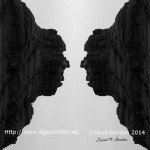 Believe it or not, there are still some people who feel that digital photography is not art. Although their numbers have been dwindling, they are still out there. Some are “old school” darkroom workers who process their black and white film and make their own prints in a traditional wet darkroom. Others are involved in the art world in some other way such as writers, academics, gallery owners, museum directors, etc. Of course, similar arguments still resurface on the topic of whether photography itself is art or not.
Believe it or not, there are still some people who feel that digital photography is not art. Although their numbers have been dwindling, they are still out there. Some are “old school” darkroom workers who process their black and white film and make their own prints in a traditional wet darkroom. Others are involved in the art world in some other way such as writers, academics, gallery owners, museum directors, etc. Of course, similar arguments still resurface on the topic of whether photography itself is art or not.
Certainly, they are entitled to their opinions on this. Perhaps they feel that because the images are edited on a computer in software programs such as Adobe Photoshop, that such activities constitute manipulation and are not as valid as those made in more traditional modalities.
Its funny how we all tend to cling to old beliefs. In fact, if truth be known, I used to be one of the darkroom purists when digital cameras first emerged on the scene. I would get angry if anyone would suggest that digital had a place in fine art photography and emphatically stated that I would never do that. Then a couple of years later, I purchased my first digital camera, a 4MP E-10 made by Olympus. I justified the purchase by saying that I was only using it as a “sketchbook” and that I would continue with my real fine art film photography. But as time went on, the film camera spent more time in the trunk of my car while I explored the world with the E-10 digital.
Eventually, I stopped bringing the film camera with me and also realized that I was taking many more pictures than I ever had before. Some of them were actually better than what I had done previously with film. Digital made it easy to take more pictures, have immediate feedback, learn from my mistakes and grow as an artist.
At the same time, I was having back and neck problems. It was becoming more and more difficult to stand on the hard basement floor bent over the darkroom sink or enlarger for long periods of time. I started taking classes at a local Community College, learned Photoshop, Illustrator and other electronic imaging programs. I now work solely in my digital darkroom for photography but also dabble in drawing and painting.
Are digital photographs manipulated? Of course they are to one degree or another. But so is traditional photography. The choice of film, developer, filters, lens focal length, paper grades, chemistry are all forms of manipulation. Choosing the moment to click the shutter, camera position, time of day, what to include and exclude in the frame, juxtaposition and composition are as well.
Perhaps what some people are finding objectionable is the over-manipulation that is so prevalent in some digital photos. I’m talking about the over-filtered, over-saturated, HDR grunge look that has become popular amongst some practitioners as an example in point. But digital photography is simply another medium. And just like oil, acrylics, pastel, charcoal, graphite and film, it can be done well or poorly. Its the final image that is important and not the process or tools by which it was made.
